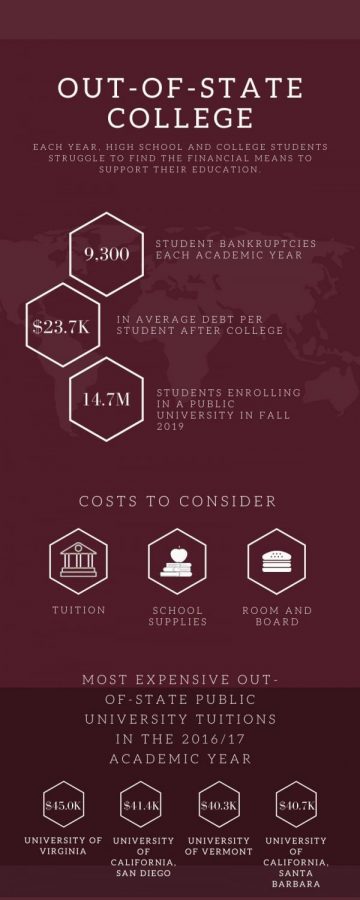Out of state, out of reach
A double standard is pushed on students when deciding on their future
Information courtesy of Classes and Careers
The pit feeling of dread and pensiveness crosses every about-to-be college student’s mind. Deciding whether or not higher education is their true calling is no easy task, and the bill only makes it harder. The ongoing financial struggle– that tends to take up a decent portion of one’s life– is hair-ripping and stressful as is. Tuition for numerous out-of-state public universities is far too high for non-residents and should be reconsidered for a lower price similar to that of a state resident.
April 28, 2020
Every child from the age of adolescence is trapped with the eerie feeling of the unknown and the future. We are taught to get good grades, go to college, get a job. That’s the blueprint. As students become situated in high school, the goal is to complete as many tasks as possible to receive high honors—some of those amounting to nothing in the end. While us youth are asked to plan out our future, there’s a double-sided sword pointed at us when it comes to expectations.
The stress increases and bubbles throughout the junior year with the anxiety of test scores and rumors of what colleges are looking for or whether it’s a good idea to even go to college. Right in the age of puberty and beginning to understand what type of person they want to be, teenagers are preparing to take the next step of their lives and most likely the biggest one yet. Expectations from everyone around them only add to the pressure: family legacies, competitive peers and what everyone else thinks they can amount to.
So much is asked of students in the most crucial time of their lives thus far. Once senior year begins, it’s a scramble to figure out everything adulting that students can fit in their brains. Although not completely transparent, everyone their age is terrified and has no idea where to start. Some are blessed with the satisfaction of knowing exactly what they’re doing after high school— college, military or otherwise. Those who don’t have difficult decisions to make.
State schools are the standard. It is what is known, what is cost-effective, what most people imagine a senior answering when asked: “where are you going to college next year?”. When the response of an out of state school becomes the answer, the conversation changes. From personal experience, the questions following are almost always negative and rarely about education or the fact that some people want to experience more than they have for their entire lives so far. High expectations from adults push for prestige and once students have finally pleased themselves and everyone looking over their shoulders, they find ways to pick at everything they deem wrong in your circumstance.
With the anxiety previously distilled upon teenagers, there’s suddenly a whole new ball game to be played. There is a lot of dodging questions about financial situations and wondering if moving out of state lines is the right thing. After those inevitable truths I, myself, pondered why out of state public universities’ flat rates are so expensive in general. It’s seen to some as a privilege to be able to extend our knowledge out of state lines, but the cost makes it feel like a burden.
According to the National Center for Education and Statistics, not only has the cost of undergraduate programs at public universities increased by 31 percent within the most recent decade, but the gap between in-state tuition and out-of-state tuition has grown by tens of thousands. That doesn’t even include room and board.
With heavy costs in mind, students are often forced to consider becoming an in-state resident to receive that reduced tuition. Much to my dismay, nothing can be easy. All states are different, so going to a public university in Iowa would be easier than one in Colorado. It just makes sense that I have to emancipate myself from my parents to be able to even consider the thought of being a resident of the Centennial State, right?
It’s known that the class system is no help in these circumstances, either. Isn’t financial aid supposed to help? Well lucky for us, CNN Money reports in an article “Too Poor to Pay for College, too Rich for Financial Aid ” that despite having plenty of academic and extracurricular achievements, if your family is within the middle class, you are sure to get somewhere around a few thousand a year from filling out the FAFSA. In my personal experience with peers, that’s like getting a cap full of water on an excruciatingly hot day.
Suddenly the work our parents put in to sustain a family is sufficient enough to provide for the hundreds of thousands of dollars I will have to go in for an education I want and deserve in addition to that of siblings, mortgages, bills and just day-to-day living. It’s a heavy burden to handle for people who aren’t even sure they’re making the right decision or don’t want to disappoint.
In these circumstances, the fight for scholarships ensues. What’s more stressful than the pending future? Paying for the pending future. In an article on out-of-state tuition and scholarships published by U.S. News, state schools are less likely to give financial aid to non-residents and are on average three times more expensive. Throughout the various websites I’ve scoured for any possible scholarships, very few were available to those coming from out of state. Nothing is more welcoming than a nice middle finger to those already working hard enough to get into the institution that they’ve dreamed of going.
Hard enough as it is, students that plan on leaving the only place they’ve ever known have so much to consider after the mind-boggling financial stress is settled. I know for myself that it’s a struggle to imagine doing things for the last time. My last time seeing my favorite regular at work. My last time going to Vala’s Pumpkin Patch. My last time singing happy birthday to my best friends. Every day I think about the last time I’ll get to do something that has been so normal to me for the last 18 years.
However, this feeling isn’t unique to me. Even in-state students feel this, but I think there’s a different level of understanding that comes with knowing you’re leaving and not coming back unless it’s for family. We have to make new relationships, get a new job, find interesting things to do elsewhere. The closest person I know will be an hour bus ride away, and I think what a lot of people fail to realize is that while they’re considering all the negative aspects of this decision, the students are the ones that have to experience life from a whole new perspective. As much of a blessing that is, it is a level of terrifying that I can’t even put into words. We know it’ll be worth it, that’s why we’re doing it, but there’s so much sympathy lost for those who have decided to move away.
Finding a suitable career path will continue to be an ageless cycle of criticizing others’ lives as well. This isn’t just a problem for those planning their near future, though. Adults suffer this too, but somehow still do it to others and often pass those ideologies onto the youth and the circle spins forever. I guess it’s really hard to be supportive of a dream without creating some sort of hyperbolized idea of what their life is going to be. From how much money we’ll end up making to where we’ll end up, no one can have anything to themselves.
I wish I knew why talking about my plans turns into a conversation of “You could end up across the world? How….. inconvenient. Unrealistic. Hopeful”. Every career has these preconceived notions about the before, during and after when instead of judging, we could all take a step back and realize it’s none of our business to dig into other people’s aspirations. It’s a double standard that the entire working population has to deal with, and it starts in the beginning with arising plans for the future.
It’s incredible to see people that have only thought the same way their entire life try to sympathize with your situation and struggles because what’s more inviting to the adult world than telling young adults everything they’re supposedly doing wrong? There are pros and cons to everything, and everyone is going to point out the cons so might as well do what you want.







